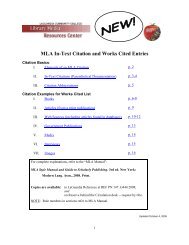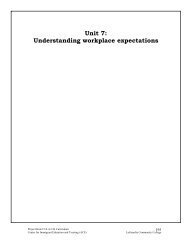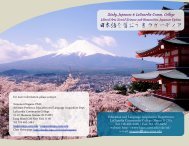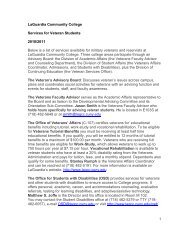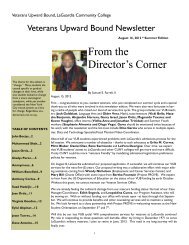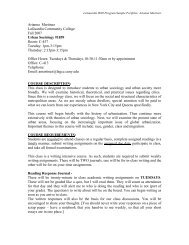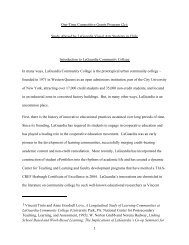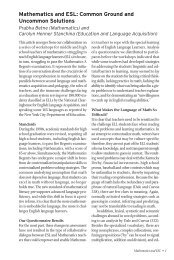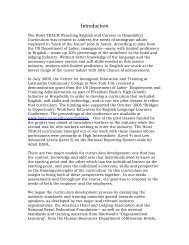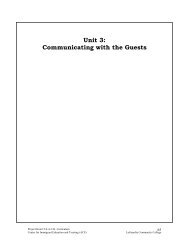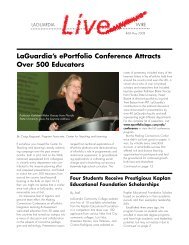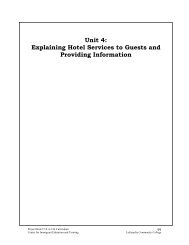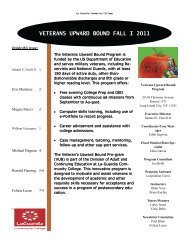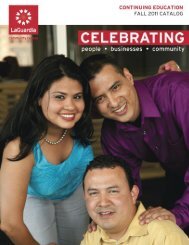COURSE INDEX - LaGuardia Community College
COURSE INDEX - LaGuardia Community College
COURSE INDEX - LaGuardia Community College
You also want an ePaper? Increase the reach of your titles
YUMPU automatically turns print PDFs into web optimized ePapers that Google loves.
Mathematics, Engineering, and Computer Science Department<br />
MAC289 Computer Technology Project Lab<br />
2 credits; 2 hours<br />
This course reinforces the student’s concepts of digital circuit-board<br />
fabrication for computer and communication devices through the<br />
construction of projects. Topics include: lab safety, reading<br />
schematic diagrams, PC board layout design and construction, components<br />
soldering and wirewrapping. The student will also learn the<br />
techniques of troubleshooting the devices using the instruments provided<br />
by the laboratory. The projects will vary. The student should<br />
expect to pay for additional materials for this course.<br />
Prerequisite: MAC261 or MAC292<br />
MAC291 Computer Logic, Design and Implementation I<br />
4 credits; 5 hours (3 lecture, 2 lab)<br />
This course will teach students how a computer logic statement is<br />
converted into an actual circuit. Using binary notation and<br />
Boolean algebra, the student will analyze switching networks of<br />
logic gates. The circuits which are mathematically described will<br />
then be translated into wiring diagrams and implemented on logic<br />
trainers and/or prototype boards. The student should expect to<br />
pay for additional materials for this course.<br />
Prerequisite: MAC241, MAT241<br />
MAC292 Computer Logic, Design and Implementation II<br />
4 credits; 5 hours (3 lecture, 2 lab)<br />
Students will learn to analyze sequential networks. The use of flipflops<br />
in circuits, such as binary counters, serial adders, parallel<br />
multipliers and code converters will be studied. Wave form<br />
analysis will be done in the lab using oscilloscopes and logic<br />
devices. The student should expect to pay for additional materials<br />
for this course.<br />
Prerequisite: MAC291, MAT241<br />
MAC293 Computer Repair and Network Maintenance<br />
4 credits; 5 hours (3 lecture, 2 lab)<br />
This course will provide students with the knowledge needed to<br />
diagnose and repair stand-alone and networked personal computers.<br />
The student will learn about hardware, including disk<br />
drives, mainboards, video boards, network interface cards and<br />
modems. Students will learn how to set up, diagnose, and repair<br />
network connections, servers and workstations. Students will<br />
work with testing equipment such as oscilloscopes, patch boxes,<br />
LAN testers, and wiring tools. General software diagnostic tools<br />
will be used. The student should expect to pay for additional<br />
materials for this course.<br />
Prerequisite: MAC231 or MAC232 or MAC233 or MAC292<br />
MAC295 Computer Architecture<br />
4 credits; 5 hours (3 lecture, 2 lab)<br />
This course is intended for students who are in the computer<br />
science program or for students interested in developing a background<br />
in hardware concepts. Topics covered include number systems,<br />
logic circuits, arithmetic circuits, flip-flops, registers,<br />
memories, sample designs of simple computers and an introduction<br />
to microprogramming. The student should expect to pay for<br />
additional materials for this course.<br />
Prerequisite: MAC196 or MAC265, MAT200 or MAT241<br />
Engineering Science<br />
MAE100 Computer-Aided Design<br />
4 credits; 4 hours<br />
This course introduces the student to AutoCAD’s friendly pulldown<br />
menus as a tool to create graphical representations of<br />
objects. The course covers introduction of dimensioning systems,<br />
fundamentals of orthographic views of real-world objects, and<br />
basic two-dimensional drafting techniques. The course includes<br />
the creation of three-dimensional objects and their modification<br />
by changing the rendering options, material and lighting properties.<br />
Views of assemblies and animations are also considered.<br />
Pre- or Corequisite: CSE095, ENA/ENG/ESA099/ENC101,<br />
MAT096<br />
MAE101 Engineering Lab 1<br />
1 credit; 3 hours (lab)<br />
This is the first of two engineering laboratory courses. Students<br />
meet once a week and are introduced to engineering design<br />
through hands-on laboratory work using computer applications.<br />
They are taught how to carry out basic structural analysis; in particular,<br />
they are introduced to programming a robot to perform a<br />
specific task. Additionally, they work in groups on design projects<br />
and are expected to use computers for documentation, for data<br />
analysis, and for maneuvering the robots.<br />
Prerequisite: MAT200<br />
MAE103 Engineering Lab 2<br />
2 credits; 3 hours (lab)<br />
This course presents selected mathematical concepts and techniques<br />
of engineering science, using Matlab. It reinforces the<br />
importance of qualitative and quantitative reasoning, and introduces<br />
computer-based methods for verifying analytic reasoning<br />
and experimental results.<br />
Prerequisite: MAT201<br />
MAE107 Manufacturing Processes<br />
3 credits; 2 Classroom hours/ 3 Lab Hours<br />
The goal of this course is to introduce students to general concepts<br />
in manufacturing. Different materials, tools and fabrication<br />
processes will be presented, with emphasis on the lathe and drilling,<br />
milling and grinding machines. Welding materials, techniques and<br />
symbols are introduced. Programming of Computerized Numerical<br />
Control (CNC) machines is also included, complemented with<br />
robotic programming for flexible manufacturing of components.<br />
Prerequisite: HUA104<br />
Pre- or Corequisite: ENC/ENG101, MAE100<br />
MAE211 Engineering Mechanics: Statics<br />
3 credit; 3 hours<br />
This course is designed to introduce students to the theory and<br />
applications of engineering mechanics – statics. Topics to be covered<br />
include equivalent systems of forces, resultants, distributed<br />
forces, equilibrium of rigid bodies, centroids, centers of gravity,<br />
fluid statics, moments of inertia and friction. Analysis of frames<br />
and machines, forces in beams, internal stresses and stability will<br />
160



